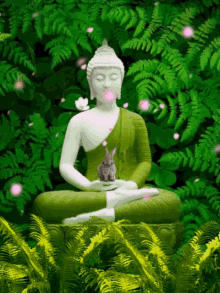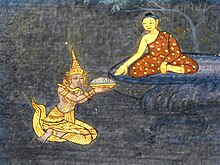busy chalking out his next course of action for and has already firmed up partnership plans for his next interface with a
wonderful explanation of how perceptions turn into actions, further
awakened by the simile of the blazing torch. Remain diligently mindful
to dispel unwholesome thoughts!
as,if a man dropped a burning torch in a thicket of dry grass and if he
would extinguish it quickly with his hands & feet,then,the beings
living in the thicket of dry grass would not undergo misfortune &
misery; in the same way, if an ascetic or a brahman abandons thus
quickly an inappropriate perception arisen in him,if he dispels
it,suppresses it,brings it to its cessation,he dwells in well-being in
visible phenomena,without vexation,without agitation, without fever;
& at the breakup of the body,after death,a good destination can be
expected.


thought of sensuality, bhikkhus, arises with a cause, not without a
cause; a thought of ill-will arises with a cause, not without a cause; a
thought of violence arises with a cause, not without a cause. And how,
bhikkhus, does a thought of sensuality arise with a cause, not without a
cause; a thought of ill-will arise with a cause, not without a cause; a
thought of violence arise with a cause, not without a cause?
account of the element of sensuality, bhikkhus, arises a perception of
sensuality, on account of a perception of sensuality arises an intention
of sensuality, on account of an intention of sensuality arises a desire
of sensuality, on account of a desire of sensuality arises an ardor of
sensuality, on account of an ardor of sensuality arises a quest of
sensuality. For the sake of a quest of sensuality, bhikkhus, an
uninstructed ordinary individual conducts himself erroneously in three
ways: in body, in speech and in mind.
account of the element of ill-will, bhikkhus, arises a perception of
ill-will, on account of a perception of ill-will arises an intention of
ill-will, on account of an intention of ill-will arises a desire of
ill-will, on account of a desire of ill-will arises an ardor of
ill-will, on account of an ardor of ill-will arises a quest of ill-will.
For the sake of a quest of ill-will, bhikkhus, an uninstructed ordinary
individual conducts himself erroneously in three ways: in body, in
speech and in mind.
account of the element of violence, bhikkhus, arises a perception of
violence, on account of a perception of violence arises an intention of
violence, on account of an intention of violence arises a desire of
violence, on account of a desire of violence arises an ardor of
violence, on account of an ardor of violence arises a quest of violence.
For the sake of a quest of violence, bhikkhus, an uninstructed ordinary
individual conducts himself erroneously in three ways: in body, in
speech and in mind.
as, bhikkhus, if a man dropped a burning torch in a thicket of dry
grass and if he would not extinguish it quickly with his hands and feet,
then, bhikkhus, the beings living in the thicket of dry grass would
undergo misfortune and misery; in the same way, bhikkhus, if an ascetic
or a brahman does not abandon thus quickly an inappropriate perception
arisen in him, if he doesn’t dispel it, suppress it, bring it to its
cessation, he dwells in suffering in visible phenomena, vexed, agitated,
in fever; and at the breakup of the body, after death, a bad
destination can be expected.
thought of renunciation, bhikkhus, arises with a cause, not without a
cause; a thought of non-ill-will arises with a cause, not without a
cause; a thought of non-violence arises with a cause, not without a
cause. And how, bhikkhus, does a thought of renunciation arise with a
cause, not without a cause; a thought of non-ill-will arise with a
cause, not without a cause; a thought of non-violence arise with a
cause, not without a cause?
account of the element of renunciation, bhikkhus, arises a perception
of renunciation, on account of a perception of renunciation arises an
intention of renunciation, on account of an intention of renunciation
arises a desire of renunciation, on account of a desire of renunciation
arises an ardor of renunciation, on account of an ardor of renunciation
arises a quest of renunciation. For the sake of a quest of renunciation,
bhikkhus, an instructed noble disciple conducts himself correctly in
three ways: in body, in speech and in mind.
account of the element of non-ill-will, bhikkhus, arises a perception
of non-ill-will, on account of a perception of non-ill-will arises an
intention of non-ill-will, on account of an intention of non-ill-will
arises a desire of non-ill-will, on account of a desire of non-ill-will
arises an ardor of non-ill-will, on account of an ardor of non-ill-will
arises a quest of non-ill-will. For the sake of a quest of non-ill-will,
bhikkhus, an instructed noble disciple conducts himself correctly in
three ways: in body, in speech and in mind.
account of the element of non-violence, bhikkhus, arises a perception
of non-violence, on account of a perception of non-violence arises an
intention of non-violence, on account of an intention of non-violence
arises a desire of non-violence, on account of a desire of non-violence
arises an ardor of non-violence, on account of an ardor of non-violence
arises a quest of non-violence. For the sake of a quest of non-violence,
bhikkhus, an instructed noble disciple conducts himself correctly in
three ways: in body, in speech and in mind.
as, bhikkhus, if a man dropped a burning torch in a thicket of dry
grass and if he would extinguish it quickly with his hands and feet,
then, bhikkhus, the beings living in the thicket of dry grass would not
undergo misfortune and misery; in the same way, bhikkhus, if an ascetic
or a brahman abandons thus quickly an inappropriate perception arisen in
him, if he dispels it, suppresses it, brings it to its cessation, he
dwells in well-being in visible phenomena, without vexation, without
agitation, without fever; and at the breakup of the body, after death, a
good destination can be expected.
bhikkhave, uppajjati kāmavitakko, no anidānaṃ; sanidānaṃ uppajjati
byāpāda-vitakko, no anidānaṃ; sanidānaṃ uppajjati vihiṃsā-vitakko, no
anidānaṃ. Kathañca, bhikkhave, sanidānaṃ uppajjati kāmavitakko, no
anidānaṃ; sanidānaṃ uppajjati byāpāda-vitakko, no anidānaṃ; sanidānaṃ
uppajjati vihiṃsā-vitakko, no anidānaṃ?
bhikkhave, paṭicca uppajjati kāmasaññā, kāmasaññaṃ paṭicca uppajjati
kāmasaṅkappo, kāmasaṅkappaṃ paṭicca uppajjati kāmac·chando,
kāmac·chandaṃ paṭicca uppajjati kāmapariḷāho, kāmapariḷāhaṃ paṭicca
uppajjati kāmapariyesanā. Kāmapariyesanaṃ, bhikkhave, pariyesamāno
assutavā puthujjano tīhi ṭhānehi micchā paṭipajjati: kāyena, vācāya,
manasā.
bhikkhave, paṭicca uppajjati byāpāda-saññā, byāpāda-saññaṃ paṭicca
uppajjati byāpāda-saṅkappo, byāpāda-saṅkappaṃ paṭicca uppajjati
byāpāda-c·chando, byāpāda-c·chandaṃ paṭicca uppajjati byāpāda-pariḷāho,
byāpāda-pariḷāhaṃ paṭicca uppajjati byāpāda-pariyesanā.
Byāpādapariyesanaṃ, bhikkhave, pariyesamāno assutavā puthujjano tīhi
ṭhānehi micchā paṭipajjati: kāyena, vācāya, manasā.
bhikkhave, paṭicca uppajjati vihiṃsā-saññā; vihiṃsā-saññaṃ paṭicca
uppajjati vihiṃsā-saṅkappo, vihiṃsā-saṅkappaṃ paṭicca uppajjati
vihiṃsā-c·chando, vihiṃsā-c·chandaṃ paṭicca uppajjati vihiṃsā-pariḷāho,
vihiṃsā-pariḷāhaṃ paṭicca uppajjati vihiṃsā-pariyesanā.
Vihiṃsāpariyesanaṃ, bhikkhave, pariyesamāno assutavā puthujjano tīhi
ṭhānehi micchā paṭipajjati: kāyena, vācāya, manasā.
bhikkhave, puriso ādittaṃ tiṇukkaṃ sukkhe tiṇadāye nikkhipeyya, no ce
hatthehi ca pādehi ca khippameva nibbāpeyya, evañhi, bhikkhave, ye
tiṇakaṭṭhanissitā pāṇā te anayabyasanaṃ āpajjeyyuṃ; evameva kho,
bhikkhave, yo hi koci samaṇo vā brāhmaṇo vā uppannaṃ visamagataṃ saññaṃ
na khippameva pajahati vinodeti byantīkaroti anabhāvaṃ gameti, so diṭṭhe
ceva dhamme dukkhaṃ viharati savighātaṃ saupāyāsaṃ sapariḷāhaṃ; kāyassa
ca bhedā paraṃ maraṇā duggati pāṭikaṅkhā.
bhikkhave, uppajjati nekkhammavitakko, no anidānaṃ; sanidānaṃ uppajjati
abyāpāda-vitakko, no anidānaṃ; sanidānaṃ uppajjati avihiṃsā-vitakko, no
anidānaṃ. Kathañca, bhikkhave, sanidānaṃ uppajjati nekkhammavitakko, no
anidānaṃ; sanidānaṃ uppajjati abyāpāda-vitakko, no anidānaṃ; sanidānaṃ
uppajjati avihiṃsā-vitakko, no anidānaṃ?
bhikkhave, paṭicca uppajjati nekkhamma-saññā, nekkhamma-saññaṃ paṭicca
uppajjati nekkhamma-saṅkappo, nekkhamma-saṅkappaṃ paṭicca uppajjati
nekkhamma-c·chando, nekkhamma-c·chandaṃ paṭicca uppajjati
nekkhamma-pariḷāho, nekkhamma-pariḷāhaṃ paṭicca uppajjati
nekkhamma-pariyesanā. Nekkhamma-pariyesanaṃ, bhikkhave, pariyesamāno
sutavā ariya·sāvako tīhi ṭhānehi sammā paṭipajjati: kāyena, vācāya,
manasā.
bhikkhave, paṭicca uppajjati abyāpāda-saññā, abyāpāda-saññaṃ paṭicca
uppajjati abyāpāda-saṅkappo, abyāpāda-saṅkappaṃ paṭicca uppajjati
abyāpāda-c·chando, abyāpāda-c·chandaṃ paṭicca uppajjati
abyāpāda-pariḷāho, abyāpāda-pariḷāhaṃ paṭicca uppajjati
abyāpāda-pariyesanā. Abyāpāda-pariyesanaṃ, bhikkhave, pariyesamāno
sutavā ariya·sāvako tīhi ṭhānehi sammā paṭipajjati: kāyena, vācāya,
manasā.
bhikkhave, paṭicca uppajjati avihiṃsā-saññā, avihiṃsā-saññaṃ paṭicca
uppajjati avihiṃsā-saṅkappo, avihiṃsā-saṅkappaṃ paṭicca uppajjati
avihiṃsā-chando, avihiṃsā-chandaṃ paṭicca uppajjati avihiṃsā-pariḷāho,
avihiṃsā-pariḷāhaṃ paṭicca uppajjati avihiṃsā-pariyesanā.
Avihiṃsā-pariyesanaṃ, bhikkhave, pariyesamāno sutavā ariya·sāvako tīhi
ṭhānehi sammā paṭipajjati: kāyena, vācāya, manasā.
bhikkhave, puriso ādittaṃ tiṇukkaṃ sukkhe tiṇadāye nikkhipeyya; tamenaṃ
hatthehi ca pādehi ca khippameva nibbāpeyya. Evañhi, bhikkhave, ye
tiṇakaṭṭhanissitā pāṇā te na anayabyasanaṃ āpajjeyyuṃ. Evameva kho,
bhikkhave, yo hi koci samaṇo vā brāhmaṇo vā uppannaṃ visamagataṃ saññaṃ
khippameva pajahati vinodeti byantīkaroti anabhāvaṃ gameti, so diṭṭhe
ceva dhamme sukhaṃ viharati avighātaṃ anupāyāsaṃ apariḷāhaṃ; kāyassa ca
bhedā paraṃ maraṇā sugati pāṭikaṅkhā ti.

 cucumber
cucumber  carrot
carrot  Beans
Beans vegetables
vegetables ![]() in pots
in pots & dwarf fruit
& dwarf fruit  bearing
bearing![]()
![]()
![]() plants
plants ![]() & trees
& trees ![]()
![]() all over the world
all over the world ![]() & be happy
& be happy ![]() & proud
& proud![]() like an elephant
like an elephant ![]()

 like what Sujata
like what Sujata  who fed hungry Buddha, Manimegali who fed the poor
who fed hungry Buddha, Manimegali who fed the poor
with her Amudha Surabhi, Ashoka the Great who planted Fruit Bearing trees
all over his empire. Maha Mayawati  Ms Maha Mayawati Dares BJP To Hold Polls Using Ballot Papers said she will bring back Ashokan
Ms Maha Mayawati Dares BJP To Hold Polls Using Ballot Papers said she will bring back Ashokan
rule by changing the face of the country first.

నుండి పదవీ విరమణ తర్వాత, JC విమలో ఆతురుతలో ఉన్న వ్యక్తిగా ఉన్నాడు.
కార్పొరేట్ గౌను, విమానం పునఃప్రారంభం మరియు అభివృద్ధిలో సుదీర్ఘ
ఇన్నింగ్స్ తర్వాత తన తదుపరి చర్యను తయారు చేయడం మరియు ఇప్పటికే తన తదుపరి
ఇంటర్ఫేస్ కోసం భాగస్వామ్య ప్రణాళికలను రూపొందించింది
టార్చ్ యొక్క అనుకరణ ద్వారా మరింత మేల్కొనే చర్యలు, చర్యలు మారిపోతాయి ఎలా
ఒక అద్భుతమైన వివరణ. అనారోగ్య ఆలోచనలను వెదజల్లడానికి శ్రద్ధతో జాగ్రత్త
వహించండి!
ఒక మనిషి పొడి గడ్డి యొక్క ఒక చిట్టడంతో ఒక దహనం టార్చ్ పడిపోయింది మరియు
అతను తన చేతులు & అడుగుల తో త్వరగా చల్లారు ఉంటే, అప్పుడు, పొడి గడ్డి
యొక్క చిట్టడవి నివసిస్తున్న జీవులు దురదృష్టం మరియు కష్టాలు చేయలేరు; అదే
విధంగా, ఒక సన్యాసిని లేదా బ్రాహ్మణుడికి త్వరలోనే ఒక తగని అవగాహనను
విడిచిపెట్టినట్లయితే, దానిని అణచివేస్తే, దాని విరమణకు తెస్తుంది, అతను
దాని విరమణకు తెస్తుంది, అతను ఆందోళన లేకుండా, వాస్తవానికి కనిపించే
దృగ్విషయం , జ్వరం లేకుండా; మరియు శరీరం యొక్క విచ్ఛిన్నం వద్ద, మరణం
తరువాత, ఒక మంచి గమ్యం ఊహించవచ్చు.
ప్రతి ఈత కొలను మొదలు పెట్టకూడదు మరియు వికలాంగుల కోసం మరియు మొక్కల
కూరగాయలు మరియు మరగుజ్జు పండు ½ బేరింగ్ పండ్ల కోసం గొప్ప అనారోగ్యంతో
గొప్ప అనారోగ్యంతో, గొప్ప బాధతో కూడిన వ్యాధి, గొప్ప బాధను అధిగమించి, దాని
వద్ద ఈ రియాలిటీ:
జీవనశైలిని పోషించవచ్చని మేము పోషించాము! అన్ని సమాజాల ప్రయోజనం కోసం
ప్రపంచవ్యాప్తంగా మరియు వారి తుది లక్ష్యంగా శాశ్వతమైన ఆనందం సాధించడానికి
వారికి?
DO GOOD PURIFY MIND-To Create Awaken Universe Grow Vegetables and Fruits plants
PURIFY MIND-To Create Awaken Universe Grow Vegetables and Fruits plants
109) Classical Urdu- کلاسیکی اردو
DO GOOD PURIFY MIND-To Create Awaken Universe Grow Vegetables and Fruits plants
PURIFY MIND-To Create Awaken Universe Grow Vegetables and Fruits plants
 PURIFY MIND-To Create Awaken Universe Grow Vegetables and Fruits plants
PURIFY MIND-To Create Awaken Universe Grow Vegetables and Fruits plantsسے ریٹائر ہونے کے بعد، JC Vimalo جلدی میں ایک آدمی لگتا ہے. کارپوریٹ سے
Honcho، ہوائی جہاز Resaerch اور ترقی میں ایک طویل اننگز کے بعد کے لئے
کارروائی کی ان کی اگلی کورس باہر مصروف چاکنگ ہے اور پہلے سے ہی ایک کے
ساتھ ان کے اگلے انٹرفیس کے لئے شراکت داری کے منصوبوں اپ firmed کیا ہے
طرح کے تصورات کے اعمال میں تبدیل کی ایک شاندار وضاحت، مزید بھڑکتی ہوئی
مشعل کی تشبیہ سے بیدار. دور unwholesome کی سوچوں کو تندہی سے ہوشیار
رہیں!
پر، ایک آدمی اور خشک گھاس کی ایک جھاڑی میں ایک جلتی مشعل گرا تو اس نے
اپنے ہاتھوں اور پاؤں کے ساتھ فوری طور پر اسے بجھا دیں گے، تو پھر، خشک
گھاس کی جھاڑی میں جاندار کی بدقسمتی اور مصائب سے گزرنا نہیں کریں گے؛ اسی
طرح میں، اگر ایک یوگی یا اس طرح ایک برہمن ترک فوری طور پر اس میں پیدا
ہو گئی ایک نامناسب خیال، وہ اس کا خاتمہ ہو، یہ،،، تحریک کے بغیر
suppresses ہے اس کے خاتمے کے لیے جو لاتا ہے وہ چڑھ بغیر دستیاب مظاہر میں
بہبود میں بستا ، بخار کے بغیر؛ اور جسم کے ٹوٹنے میں، موت کے بعد، ایک
اچھی منزل مقصود کی توقع کی جا سکتی ہے.
جو شخص - مرد ہو یا عورت، آٹھ وجوہات Uposatha کے فضائل کے ساتھ عطا -is،
میداوی اعمال نعمت کے، پیداواری کئے ہوں ملامت پرے، آسمانی ریاست کو جاتا
ہے.
تالابوں شروع نہیں کرنا چاہئے عظیم کیا اور بھوک بیمار سب سے بڑا، سب سے
بڑی مصائب-conditionedness پر قابو پانے کے برتنوں میں کہاں اور اشوک طرح
معذور افراد اور پلانٹ سبزیاں اور بونے پھل
زندگی کی پرورش ہو سکتی ہے کہ غذائیت ہو! تمام معاشروں کے فائدے کے لیے
اور ان کے لیے دنیا بھر میں ان کے حتمی مقصد کے طور پر ابدی فلاح کے لیے؟
#UttarPradeshAssemblyelection,
DO GOOD PURIFY MIND-To Create Awaken Universe Grow Vegetables and Fruits Plants
PURIFY MIND-To Create Awaken Universe Grow Vegetables and Fruits Plants
93) Classical Sinhala-සම්භාව්ය සිංහල,
ARDC සිට විශ්රාම යාමෙන් පසුව, ජේ.සී. Vimalo කඩිමුඩියේ මිනිසෙකු බව පෙනේ.
සංගත ෙහොන්ෙෂෝ, ගුවන් යානා Resaerch හා සංවර්ධන දී දීර්ඝ ඉනිම සඳහා පියවර
ඔහුගේ ඊළඟ පාඨමාලාව සිදු කාර්යබහුල chalking වන අතර මේ වන විටත් ඔහුගේ ඊළඟ
අතුරු මුහුණත සඳහා හවුල්කාරිත්වය සැලසුම් තිබීමත් නිසා පසු
තද අව් විදුලි පන්දමේ simile විසින් අවදි විමසන ලදී ක්රියා බවට පත් කරන්නේ
කෙසේද යන්න ග්රහණය කර පුදුම පැහැදිලි කිරීමක්. වසල සිතුවිලි පහ කිරීමට ඉතා
උනන්දුවෙන් දැනුවත්ව සිටින්න!
වියළි තණ පඳුරක ඔහු තම අත් හා පාද සහිත ඉක්මනින් එය නිවා වනු නම් ගිනි
සිළුව දැල්වීමේ වැටී නම්, එසේ නම්, වියළි තෘණ වන පඳුරක ජීවත් වන මිනිසුන්
අවාසනාව සහ කාලකන්නි භාජනය නැහැ, කවෙර්ද; එකම විදිහට, තාපසයෙකු හෝ brahman
පිළිකුළක් මෙසේ ඉක්මනින් ඔහු තුළ මතුව නුසුදුසු සංජානනය නම්, ඔහු එය
dispels නම්, එය මර්දනය, එය එහි සටන් නැවැත්වීම කි්රයාත්මක කිරීමට ගෙන එයි,
ඔහු දෘශ්ය සංසිද්ධීන් හොඳින් වීම, vexation තොරව, උද්ඝෝෂණ වලින් තොරව වාසය
, උණ නැතුව සහ ශරීරයේ බිඳ වැටීම දී, මරණයෙන් පසු හොඳ ගමනාන්තයක් අපේක්ෂා
කළ හැක.
නිසා යමෙක් - පුරුෂයෙක් හෝ ස්ත්රියක් අට සාධකවලට සිදු පින්, නිවන් සුවය,
ඵලදායී සහිත Uposatha, එම ගුණ සහිත වෙයි විශාලයි, නින්දා අපහාස ඔබ්බට,
ස්වර්ගීය රාජ්ය යනවා.
අශෝක වැනි දරණ ශාක මහා කළේ සහ හන්ගර් අසනීප ශ්රේෂ්ඨතම, උතුම්ම
දුක්-conditionedness ජය ගැනීමට භාජන වල, අවදි එක් හොඳින් දන්නෙකු පවසයි
පිහිනුම් ආරම්භ නොකළ යුතුය එය මේ සත්යය:
ජීවිතය පෝෂණය හැකි බව පෝෂණය කළ හැකිය! සියලු සමිති යහපත සඳහා සහ ඔවුන්ගේ
අවසන් ඉලක්කය ලෙස සදාකාල ඔවුන්ම සකසා ගැනීමට සඳහා ලොව පුරා?
DO GOOD PURIFY MIND-To Create Awaken Universe Grow Vegetables and Fruits Plants
PURIFY MIND-To Create Awaken Universe Grow Vegetables and Fruits Plants
ဗုဒ္ဓဘာသာ၏ကိုယ်ပိုင်စကားလုံးများကိုဖြန့်ချိခြင်းဖြင့်ထာဝရချ မ်းသာရရန်လူ့အဖွဲ့အစည်းအားလုံး အားလုံးအတွက်လူ့အဖွဲ့အစည်းအားလုံ းအတွက်စိတ်ကိုကြည့်ပါ
များစွာသောသူတို့နှင့်များစွာသောသူတို့၏ကောင်းကျိုးအတွက်
ARDC မှအနားယူပြီးနောက် JC Vimalo သည်အလျင်အမြန်အမျိုးသားတစ် ဦး ဖြစ်ပုံရသည်။ လေယာဉ် resaerch နှင့်ဖွံ့ဖြိုးတိုးတက်မှုနှင့်ဖွံ့ဖြိုးတိုးတက်မှုကာလရှည်လျား သောဝင်ရိုက်ချက်များနှင့်ဖွံ့ဖြို းတိုးတက်မှုအပြီးတွင်ကော်ပိုရေး ရှင်း Honcho သည်သူ၏နောက်လုပ်ဆောင်မှုလမ်းကြေ ာင်းကိုအ 0 တ်လျှော်ခြင်းဖြင့်အလုပ်များနေ ပြီးသူ၏နောက်လာမည့် interface အတွက်မိတ်ဖက်အစီအစဉ်များကိုပြု လုပ်နေသည်
Agaked ashoka 



















 vetablablatablesသင်၏ yews စကြာနှင့်အာကာသတစ်လျှောက်တွင်စို
vetablablatablesသင်၏ yews စကြာနှင့်အာကာသတစ်လျှောက်တွင်စိုက်ပျိုးသူများပါတီ။
Sanitāna Sutta
- အကြောင်းမရှိနှင့်အတူ -
အဘယ်အမြင်များသည်လုပ်ရပ်များပြောင်းလဲခြင်းနှင့် ပတ်သက်. အံ့သြဖွယ်ရှင်းပြချက်တစ်ခု, စိတ်ရှုပ်ထွေးစေသောအတွေးများကို ဖယ်ရှားရန်စိတ်ကူးယဉ်သတိထားပါ။
အကယ်. လူတစ်ယောက်သည်ခြောက်သွေ့သောမြက်ပင်ထူသောမြက်ပင်ဖြင့်လောင်ကျွမ် းနေသောမီးကိုလောင်ကျွမ်းစေပြီး သူသည်လက်နှင့်ခြေထောက်များကိုလျ င်မြန်စွာငြိမ်းသတ်နိုင်လျှင်, ထိုနည်းတူစွာပင် abscetic သို့မဟုတ် brahman သည်အလျင်အမြန်စွန့်လွှတ်ပါကဤသို့ အလျင်အမြန်မသင့်လျော်သောအမြင်မျ ားကိုအလျင်အမြန်ပေါ်ပေါက်လာပါ ကသူသည်ဖြိုခွဲပါက၎င်းကိုနှိုးဆွ ရန်, ဖျားနာခြင်းမရှိဘဲ, ခန္ဓာကိုယ်၏ပြိုကွဲခြင်းတွင်သေ ပြီးနောက်ကောင်းမွန်သော ဦး တည်ရာကိုမျှော်လင့်နိုင်သည်။
Ashaka 














































 အခမဲ့ငှက်များ
အခမဲ့ငှက်များ သတိထားသော meditativeswimming
သတိထားသော meditativeswimming 
 ထို့ကြောင့်မည်သူမဆို - မည်သူမဆို - ဆော့ဖ်ဝဲသည်ဆွေမျိုးသားရှစ်ဆော့
ထို့ကြောင့်မည်သူမဆို - မည်သူမဆို - ဆော့ဖ်ဝဲသည်ဆွေမျိုးသားရှစ်ဆော့ဆော့သီတာ၏သီလနှင့်ပြည့်နှက်နေပြီ း, ကဲ့ရဲ့ရှုတ်ချမှုများ,
ကျွန်ုပ်တို့သည်မသန်စွမ်းသူများနှင့်အပင်များစိုက်ပျိုးခြင်းနှ င့်အပင်များကဲ့သို့ဟင်းသီးဟင်း ရွက်များနှင့်အပင်များစိုက်ပျို းခြင်းသည်အကြီးမြတ်ဆုံးသောဆင်း ရဲဒုက္ခကိုကျော်လွှားနိုင်သည့် အပင်များနှင့်အသည်းအသန်ဖျားနာခြ င်း, ဒီအဖြစ်မှန်ကတော့:
အန္တိမပျော်ရွှင်မှုကိုအမြင့်ဆုံးသောဆင်းရဲဒုက္ခအဆုံးဖြစ်သည်။
မြေကြီးသည်ပိုက်ကွန် - နွေ ဦး ရာသီ (Amudha Surabhi, Air, Air, ရေ, မီးသည်ဤအစားအစာကိုပေါင်းစပ်ရန်ပေါင်းစပ်ထားသည်။
မရေမတွက်နိုင်သော sentient နှင့်မဟုတ်သောသတ္တဝါများသည်ကျွန်ုပ်တို့စားနိုင်သည့်ဘ 0 နှင့်အလုပ်သမားများအားပေးသည်။
ကျွန်ုပ်တို့သည်ဘဝကိုအာဟာရဖြစ်စေသောကြောင့်ကျွန်ုပ်တို့အာဟာ ရရပါစေ။ ကမ္ဘာတစ်ဝှမ်းလုံးရှိလူ့အဖွဲ့ အစည်းအားလုံး၏အကျိုးအတွက်နှင့် သူတို့၏နောက်ဆုံးပန်းတိုင်အဖြစ် ထာဝရချမ်းသာရရန်သူတို့အတွက်ကမ္ ဘာတစ်ဝှမ်းရှိကမ္ဘာတစ်ဝှမ်းရှိ လော။
အေးဆေးတည်ငြိမ်အေးဆေး, နိုးနိုးကြားကြား,
အရာအားလုံးပြောင်းလဲနေကြောင်းရှင်းရှင်းလင်းလင်းနားလည်မှုနှင့် အတူ။
Bodhisattva ၏ကြောက်ရွံ့မှုကြောင့်ကြောက်ရွံ့ခြင်းပင်ကြောက်ရွံ့ခြင်းပင်။
ထိုအခါသင်၏နိုးထနေသောသင် esterseine ဖန်တီးသည်။
DO GOOD PURIFY MIND-To Create Awaken Universe Grow Vegetables and Fruits Plants
PURIFY MIND-To Create Awaken Universe Grow Vegetables and Fruits Plants
DO GOOD PURIFY MIND-To Create Awaken Universe Grow Vegetables and Fruits plants
PURIFY MIND-To Create Awaken Universe Grow Vegetables and Fruits plants
17) Classical Bengali-ক্লাসিক্যাল বাংলা,
বুদ্ধের নিজস্ব শব্দ প্রচার করে শাশ্বত সুখ অর্জনের জন্য সমস্ত সমাজের জন্য সমস্ত সমাজের পথ করুন
অনেকের লাভের জন্য এবং অনেকের কল্যাণের জন্য
Ardc
থেকে অবসর গ্রহণের পরে, জেসি Vimalo তাড়াতাড়ি একটি মানুষ বলে মনে হচ্ছে।
বিমানটি রেসার্চ এবং বিকাশের একটি দীর্ঘ ইনিংসের পরে কর্পোরেট হ্যানচো তার
পরবর্তী কর্মকাণ্ডের জন্য তার পরবর্তী কর্মকাণ্ডের জন্য ব্যস্ত থাকেন এবং
ইতিমধ্যেই তার পরবর্তী ইন্টারফেসের জন্য অংশীদারিত্বের পরিকল্পনাটি দৃঢ়
করেছেন।
বিনামূল্যে অনলাইন কৃষি ইউনিভার্সিটি as awakened ashoka 

 ফল এবং
ফল এবং 






 আপনার ইউনিভার্সি এবং স্থান জুড়ে Grogers পার্টি পান।
সানদনা সূতটা
- একটি কারণ সঙ্গে -
কিভাবে
আপনার ইউনিভার্সি এবং স্থান জুড়ে Grogers পার্টি পান।
সানদনা সূতটা
- একটি কারণ সঙ্গে -
কিভাবে
উপলব্ধি কর্মে পরিণত হয় একটি বিস্ময়কর ব্যাখ্যা, জ্বলন্ত টর্চ এর simile
দ্বারা আরও জাগ্রত। অযৌক্তিক চিন্তাভাবনা দূর করার জন্য কঠোরভাবে মনোযোগ
দিন!
ঠিক যেমন,
যদি একজন মানুষ শুকনো ঘাসের ঝড়ের মধ্যে জ্বলন্ত মশাল ফেলে দেয় এবং যদি সে
তার হাত ও পায়ের সাথে তাড়াতাড়ি ঢুকে পড়বে তবে শুষ্ক ঘাসের ঝড়ের মধ্যে
বসবাসকারী মানুষ দুর্ভাগ্য ও দুর্ভাগ্য সহ্য করবে না; একইভাবে, যদি একটি
সন্ন্যাসী বা ব্রাহ্মণ এইভাবে ত্যাগ করেন তবে তার মধ্যে একটি অনুপযুক্ত
উপলব্ধি ঘটে, যদি সে এটিকে দমন করে তবে এটি দমন করে, সেটি তার অবসান ঘটায়,
সেটি দৃশ্যমান ঘটনাগুলিতে, অসহায় না করেই দৃশ্যমান ঘটনাতে বাস করে , জ্বর
ছাড়া; এবং শরীরের ভাঙ্গন, মৃত্যুর পর, একটি ভাল গন্তব্য আশা করা যেতে
পারে।
জাগ্রত ashoka 


 aw aw
aw aw 


 & aw aw
& aw aw 
 & & & & & & & & & & & & &
বিনামূল্যে পাখি
& & & & & & & & & & & & &
বিনামূল্যে পাখি  সচেতন meditativeswimming
সচেতন meditativeswimming 
 অতএব,
অতএব,
যে কেউ - পুরুষ বা মহিলা -আমরা আট-ফ্যাক্টর আপসথার গুণাবলী দিয়ে সন্তুষ্ট
করে, মেধাবী কাজ করে, উৎপাদনশীল, সুখের বাইরে, আনন্দের বাইরে, স্বর্গীয়
অবস্থায় যায়।
আমরা কি সাঁতার কাটতে শুরু করবো না এবং প্রতিবন্ধী ব্যক্তি এবং উদ্ভিদ সবজি এবং বামন ফল 
আশোকের মতো গাছপালা অসাধার মতো উদ্ভিদের এবং পাত্রের মধ্যে ক্ষুধা কাটিয়ে
উঠার জন্য সবচেয়ে বড় অসুস্থতা, সর্বশ্রেষ্ঠ দুঃখজনকতা বলে অভিহিত করা
উচিত এই বাস্তবতা এটি হয়:
চূড়ান্ত সুখ সর্বোচ্চ যে কষ্টের শেষ।
পৃথিবীটি নক্ষার বসন্ত (অমুধা সুরবি, বায়ু, পানি, আগুন ও স্থান এই খাবারটি তৈরি করতে একত্রিত হয়।
অচেনা সংবেদনশীল এবং অ সংবেদনশীল প্রাণী তাদের জীবন ও শ্রম যা আমরা খেতে পারি।
আমরা
পুষ্ট হতে পারি যে আমরা জীবনকে পুষ্ট করতে পারি! সারা বিশ্ব জুড়ে সমস্ত
সমাজের সুবিধার জন্য এবং তাদের জন্য তাদের চূড়ান্ত লক্ষ্য হিসাবে অনন্ত
সুখ অর্জন করা?
চলুন শান্ত, শান্ত, সতর্কতা, মনোযোগী এবং সমানতা মন আছে
সবকিছু পরিবর্তন হচ্ছে যে একটি স্পষ্ট বোঝার সঙ্গে।
“এমনকি বোদিসত্ত্বের নির্ভীকতা দ্বারা ভয় ভয় পায়।
তারপর আপনার জাগানো ইউনিভার্সি তৈরি করা হয়।
Gautam Buddha & Buddhism || বৌদ্ধধর্ম থেকে গুরুত্বপূর্ণ 60 টি প্রশ্ন || Education Notes
DO GOOD PURIFY MIND-To Create Awaken Universe Grow Vegetables and Fruits plants
PURIFY MIND-To Create Awaken Universe Grow Vegetables and Fruits plants
থেকে অবসর গ্রহণের পরে, জেসি Vimalo তাড়াতাড়ি একটি মানুষ বলে মনে হচ্ছে।
বিমানটি রেসার্চ এবং বিকাশের একটি দীর্ঘ ইনিংসের পরে কর্পোরেট হ্যানচো তার
পরবর্তী কর্মকাণ্ডের জন্য তার পরবর্তী কর্মকাণ্ডের জন্য ব্যস্ত থাকেন এবং
ইতিমধ্যেই তার পরবর্তী ইন্টারফেসের জন্য অংশীদারিত্বের পরিকল্পনাটি দৃঢ়
করেছেন।
উপলব্ধি কর্মে পরিণত হয় একটি বিস্ময়কর ব্যাখ্যা, জ্বলন্ত টর্চ এর simile
দ্বারা আরও জাগ্রত। অযৌক্তিক চিন্তাভাবনা দূর করার জন্য কঠোরভাবে মনোযোগ
দিন!
যদি একজন মানুষ শুকনো ঘাসের ঝড়ের মধ্যে জ্বলন্ত মশাল ফেলে দেয় এবং যদি সে
তার হাত ও পায়ের সাথে তাড়াতাড়ি ঢুকে পড়বে তবে শুষ্ক ঘাসের ঝড়ের মধ্যে
বসবাসকারী মানুষ দুর্ভাগ্য ও দুর্ভাগ্য সহ্য করবে না; একইভাবে, যদি একটি
সন্ন্যাসী বা ব্রাহ্মণ এইভাবে ত্যাগ করেন তবে তার মধ্যে একটি অনুপযুক্ত
উপলব্ধি ঘটে, যদি সে এটিকে দমন করে তবে এটি দমন করে, সেটি তার অবসান ঘটায়,
সেটি দৃশ্যমান ঘটনাগুলিতে, অসহায় না করেই দৃশ্যমান ঘটনাতে বাস করে , জ্বর
ছাড়া; এবং শরীরের ভাঙ্গন, মৃত্যুর পর, একটি ভাল গন্তব্য আশা করা যেতে
পারে।
যে কেউ - পুরুষ বা মহিলা -আমরা আট-ফ্যাক্টর আপসথার গুণাবলী দিয়ে সন্তুষ্ট
করে, মেধাবী কাজ করে, উৎপাদনশীল, সুখের বাইরে, আনন্দের বাইরে, স্বর্গীয়
অবস্থায় যায়।
আশোকের মতো গাছপালা অসাধার মতো উদ্ভিদের এবং পাত্রের মধ্যে ক্ষুধা কাটিয়ে
উঠার জন্য সবচেয়ে বড় অসুস্থতা, সর্বশ্রেষ্ঠ দুঃখজনকতা বলে অভিহিত করা
উচিত এই বাস্তবতা এটি হয়:
পুষ্ট হতে পারি যে আমরা জীবনকে পুষ্ট করতে পারি! সারা বিশ্ব জুড়ে সমস্ত
সমাজের সুবিধার জন্য এবং তাদের জন্য তাদের চূড়ান্ত লক্ষ্য হিসাবে অনন্ত
সুখ অর্জন করা?
DO GOOD PURIFY MIND-To Create Awaken Universe Grow Vegetables and Fruits plants
PURIFY MIND-To Create Awaken Universe Grow Vegetables and Fruits plants
105) Classical Thai-ภาษาไทยคลาสสิก,DO GOOD PURIFY MIND-To Create Awaken Universe Grow Vegetables and Fruits plants
PURIFY MIND-To Create Awaken Universe Grow Vegetables and Fruits plants
DO GOOD PURIFY MIND-To Create Awaken Universe Grow Vegetables and Fruits plants
PURIFY MIND-To Create Awaken Universe Grow Vegetables and Fruits plants
62) Classical Lao-ຄລາສສິກລາວ,
ເຮັດສິ່ງທີ່ດີ - ເສັ້ນທາງສໍາລັບສັງຄົມທັງຫມົດເພື່ອບັນລຸໄພພິບັດນິລັ ນດອນໂດຍການຂະຫຍາຍພັນຂອງພະພຸ ດທະເຈົ້າ
ສໍາລັບການໄດ້ຮັບຂອງຫຼາຍໆຄົນແລະສໍາລັບສະຫວັດດີການຂອງຫຼ າຍໆຄົນ
ຫລັງຈາກອອກບໍານານຈາກ ARDC, JC Vimalo ເບິ່ງຄືວ່າເປັນຜູ້ຊາຍທີ່ຮີບຮ້ອນ. Honcho Honchate, ຫຼັງຈາກການເຂົ້າຮ່ວມຂອງບໍລິສັ ດຢູ່ທີ່ເຮືອບິນ READERCH ແລະການພັດທະນາແມ່ນກໍາລັງຫຍຸ້ງຢູ່ ກັບແຜນການຂອງລາວສໍາລັບການໂຕ້ ຕອບຂອງລາວສໍາລັບການໂຕ້ຕອບຕໍ່ ໄປຂອງລາວກັບ
ມີຄວາມໃຝ່ຝັນກະເສດສໍາລັບການຕື່ນຕົວ anhoka 









party gamet grows ການເຕີບໃຫຍ່ຂອງຜູ້ປູກຕະຫຼອດ Younies ແລະຊ່ອງຂອງທ່ານ.
Sanidāna Sutta
- ມີສາເຫດ -
ຄໍາອະທິບາຍທີ່ດີເລີດກ່ຽວກັບຄວາມຮັບຮູ້ທີ່ຈະເປັນການກະທໍາ, ເຮັດໃຫ້ຕື່ນເຕັ້ນຕື່ມອີ ກໂດຍການເຂົ້າໄປໃນເຕົາໄຟ. ມີຄວາມຫ້າວຫັນຢ່າງລະມັດລະວັ ງໃນການຂັບໄລ່ຄວາມຄິດທີ່ບໍ່ດີ!
ຄືກັນກັບ, ຖ້າຜູ້ຊາຍໄດ້ລຸດລົງໂຄມໄຟທີ່ເຜົາໄຫມ້ໃນປ່າໄມ້ແຫ້ງແລະຖ້ າລາວຈະເຮັດໃຫ້ມັນຢູ່ໃນປ່າຫຍ້ າແຫ້ງຈະບໍ່ຢູ່ໃນຄວາມໂຊກຮ້ າຍແລະຄວາມທຸກຍາກ; ໃນວິທີການດຽວກັນ, ຖ້າຫາກວ່າເປັນຜູ້ປະຕິບັດຫຼືປະຖິ້ ມຄວາມຮູ້ສຶກທີ່ບໍ່ເຫມາະສົ ມໃນລາວ,
ລາວສະບາຍດີ, ໂດຍບໍ່ມີການ vextation, ໂດຍບໍ່ມີການກໍ່ກວນ ໂດຍບໍ່ມີອາການໄຂ້;
& ຢູ່ໃນການແຕກແຍກຂອງຮ່າງກາຍ, ຫຼັງຈາກຄວາມຕາຍ,
ຈຸດຫມາຍປາຍທາງທີ່ດີສາມາດຄາດຫວັ ງໄດ້.
ຄວາມໃຝ່ຝັນດ້ານການກະເສດ online ສໍາລັບການຕື່ນຂື້ນ anhoka 






















 throughout
throughout ាន
ាន &
&
 throughout party partyនា & throughoutន grow ທົ່ວແມ່ແລະອາວະກາດຂອງທ່ານ.
ນົກຟຣີຟຣີໃນສະມາທິໃນສະມາທິ
throughout party partyនា & throughoutន grow ທົ່ວແມ່ແລະອາວະກາດຂອງທ່ານ.
ນົກຟຣີຟຣີໃນສະມາທິໃນສະມາທິໃນສະມາທິທີ່ສະຫລາດ

ສະນັ້ນຜູ້ໃດຜູ້ຫນຶ່ງ - ຜູ້ຊາຍຫລືຜູ້ຍິງ - ນາງໄດ້ຮັບຄຸນງາມຄວາມດີຂອງການກະທໍາທີ່ມີຄວາມເມດຕາ, ມີຜົນຜະລິດ, ນອກເຫນືອຈາກລັດສະຫວັນ.
ພວກເຮົາຄວນຈະບໍ່ເລີ່ມລອຍນ້ໍາ
 , ປະຊາຊົນພິການແລະຫມາກໄມ້ທີ່ດີເລີ
, ປະຊາຊົນພິການແລະຫມາກໄມ້ທີ່ດີເລີດ ຄວາມເປັນຈິງນີ້ຢູ່ທີ່ມັນແມ່ນ:
ຄວາມສຸກສຸດທ້າຍທີ່ສຸດທີ່ແມ່ນຈຸດຈົບຂອງຄວາມທຸກ.
ໂລກພາກຮຽນ spring ຂອງ Nector (amudha surabhi, ອາກາດ, ນ້ໍາ, ໄຟແລະພື້ນທີ່ສົມທົບເພື່ອເຮັດອາຫານນີ້.
ຄວາມຈິງທີ່ບໍ່ມີຄວາມຫມາຍແລະຄວາມບໍ່ມີຕົວຕົນທີ່ ບໍ່ມີຊີວິດແລະແຮງງານຂອງພວກເຮົ າທີ່ພວກເຮົາອາດຈະກິນ.
ຂໍໃຫ້ພວກເຮົາໄດ້ຮັບການບໍາລຸງລ້ຽງທີ່ພວກເຮົາອາດຈະມີອາການບໍາລຸ ງຮັກສາຊີວິດ! ໃນທົ່ວໂລກເພື່ອຜົນປະໂຫຍດຂອງສັ ງຄົມທັງຫມົດສະຖານະການແລະໃຫ້ ພວກເຂົາເພື່ອບັນລຸໄພພິບັດນິລັ ນດອນຄືກັບເປົ້າຫມາຍສຸດທ້ າຍຂອງພວກເຂົາ?
ຂໍໃຫ້ສະຫງົບ, ງຽບ, ແຈ້ງເຕືອນ, ເອົາໃຈໃສ່ແລະມີຈິດໃຈທີ່ສົມຄວນ
ດ້ວຍຄວາມເຂົ້າໃຈທີ່ຈະແຈ້ງວ່າທຸກຢ່າງກໍາລັງປ່ຽນໄປ.
“ເຖິງແມ່ນວ່າຄວາມຢ້ານກົວກໍ່ຢ້ານກົວໂດຍຄວາມຢ້ານກົວຂອງ Bodhisattva.
ຫຼັງຈາກນັ້ນ, ທ່ານຍັງຕື່ນຂຶ້ນມາຂອງທ່ານກໍ່ຖືກສ້າງຂື້ນ.
DO GOOD PURIFY MIND-To Create Awaken Universe Grow Vegetables and Fruits plants
PURIFY MIND-To Create Awaken Universe Grow Vegetables and Fruits plants
62) Classical Lao-ຄລາສສິກລາວ,
ເຮັດສິ່ງທີ່ດີ - ເສັ້ນທາງສໍາລັບສັງຄົມທັງຫມົດເພື່ອບັນລຸໄພພິບັດນິລັ ນດອນໂດຍການຂະຫຍາຍພັນຂອງພະພຸ ດທະເຈົ້າ
ສໍາລັບການໄດ້ຮັບຂອງຫຼາຍໆຄົນແລະສໍາລັບສະຫວັດດີການຂອງຫຼ າຍໆຄົນ
ຫລັງຈາກອອກບໍານານຈາກ ARDC, JC Vimalo ເບິ່ງຄືວ່າເປັນຜູ້ຊາຍທີ່ຮີບຮ້ອນ. Honcho Honchate, ຫຼັງຈາກການເຂົ້າຮ່ວມຂອງບໍລິສັ ດຢູ່ທີ່ເຮືອບິນ READERCH ແລະການພັດທະນາແມ່ນກໍາລັງຫຍຸ້ງຢູ່ ກັບແຜນການຂອງລາວສໍາລັບການໂຕ້ ຕອບຂອງລາວສໍາລັບການໂຕ້ຕອບຕໍ່ ໄປຂອງລາວກັບ
ມີຄວາມໃຝ່ຝັນກະເສດສໍາລັບການຕື່ນຕົວ anhoka 









party gamet grows ການເຕີບໃຫຍ່ຂອງຜູ້ປູກຕະຫຼອດ Younies ແລະຊ່ອງຂອງທ່ານ.
Sanidāna Sutta
- ມີສາເຫດ -
ຄໍາອະທິບາຍທີ່ດີເລີດກ່ຽວກັບຄວາມຮັບຮູ້ທີ່ຈະເປັນການກະທໍາ, ເຮັດໃຫ້ຕື່ນເຕັ້ນຕື່ມອີ ກໂດຍການເຂົ້າໄປໃນເຕົາໄຟ. ມີຄວາມຫ້າວຫັນຢ່າງລະມັດລະວັ ງໃນການຂັບໄລ່ຄວາມຄິດທີ່ບໍ່ດີ!
ຄືກັນກັບ, ຖ້າຜູ້ຊາຍໄດ້ລຸດລົງໂຄມໄຟທີ່ເຜົາໄຫມ້ໃນປ່າໄມ້ແຫ້ງແລະຖ້ າລາວຈະເຮັດໃຫ້ມັນຢູ່ໃນປ່າຫຍ້ າແຫ້ງຈະບໍ່ຢູ່ໃນຄວາມໂຊກຮ້ າຍແລະຄວາມທຸກຍາກ; ໃນວິທີການດຽວກັນ, ຖ້າຫາກວ່າເປັນຜູ້ປະຕິບັດຫຼືປະຖິ້ ມຄວາມຮູ້ສຶກທີ່ບໍ່ເຫມາະສົ ມໃນລາວ,
ລາວສະບາຍດີ, ໂດຍບໍ່ມີການ vextation, ໂດຍບໍ່ມີການກໍ່ກວນ ໂດຍບໍ່ມີອາການໄຂ້;
& ຢູ່ໃນການແຕກແຍກຂອງຮ່າງກາຍ, ຫຼັງຈາກຄວາມຕາຍ,
ຈຸດຫມາຍປາຍທາງທີ່ດີສາມາດຄາດຫວັ ງໄດ້.
ຄວາມໃຝ່ຝັນດ້ານການກະເສດ online ສໍາລັບການຕື່ນຂື້ນ anhoka 






















 throughout
throughout ាន
ាន &
&
 throughout party partyនា & throughoutន grow ທົ່ວແມ່ແລະອາວະກາດຂອງທ່ານ.
ນົກຟຣີຟຣີໃນສະມາທິໃນສະມາທິ
throughout party partyនា & throughoutន grow ທົ່ວແມ່ແລະອາວະກາດຂອງທ່ານ.
ນົກຟຣີຟຣີໃນສະມາທິໃນສະມາທິໃນສະມາທິທີ່ສະຫລາດ

ສະນັ້ນຜູ້ໃດຜູ້ຫນຶ່ງ - ຜູ້ຊາຍຫລືຜູ້ຍິງ - ນາງໄດ້ຮັບຄຸນງາມຄວາມດີຂອງການກະທໍາທີ່ມີຄວາມເມດຕາ, ມີຜົນຜະລິດ, ນອກເຫນືອຈາກລັດສະຫວັນ.
ພວກເຮົາຄວນຈະບໍ່ເລີ່ມລອຍນ້ໍາ
 , ປະຊາຊົນພິການແລະຫມາກໄມ້ທີ່ດີເລີ
, ປະຊາຊົນພິການແລະຫມາກໄມ້ທີ່ດີເລີດ ຄວາມເປັນຈິງນີ້ຢູ່ທີ່ມັນແມ່ນ:
ຄວາມສຸກສຸດທ້າຍທີ່ສຸດທີ່ແມ່ນຈຸດຈົບຂອງຄວາມທຸກ.
ໂລກພາກຮຽນ spring ຂອງ Nector (amudha surabhi, ອາກາດ, ນ້ໍາ, ໄຟແລະພື້ນທີ່ສົມທົບເພື່ອເຮັດອາຫານນີ້.
ຄວາມຈິງທີ່ບໍ່ມີຄວາມຫມາຍແລະຄວາມບໍ່ມີຕົວຕົນທີ່ ບໍ່ມີຊີວິດແລະແຮງງານຂອງພວກເຮົ າທີ່ພວກເຮົາອາດຈະກິນ.
ຂໍໃຫ້ພວກເຮົາໄດ້ຮັບການບໍາລຸງລ້ຽງທີ່ພວກເຮົາອາດຈະມີອາການບໍາລຸ ງຮັກສາຊີວິດ! ໃນທົ່ວໂລກເພື່ອຜົນປະໂຫຍດຂອງສັ ງຄົມທັງຫມົດສະຖານະການແລະໃຫ້ ພວກເຂົາເພື່ອບັນລຸໄພພິບັດນິລັ ນດອນຄືກັບເປົ້າຫມາຍສຸດທ້ າຍຂອງພວກເຂົາ?
ຂໍໃຫ້ສະຫງົບ, ງຽບ, ແຈ້ງເຕືອນ, ເອົາໃຈໃສ່ແລະມີຈິດໃຈທີ່ສົມຄວນ
ດ້ວຍຄວາມເຂົ້າໃຈທີ່ຈະແຈ້ງວ່າທຸກຢ່າງກໍາລັງປ່ຽນໄປ.
“ເຖິງແມ່ນວ່າຄວາມຢ້ານກົວກໍ່ຢ້ານກົວໂດຍຄວາມຢ້ານກົວຂອງ Bodhisattva.
ຫຼັງຈາກນັ້ນ, ທ່ານຍັງຕື່ນຂຶ້ນມາຂອງທ່ານກໍ່ຖືກສ້າງຂື້ນ.
 PURIFY MIND-To Create Awaken Universe Grow Vegetables and Fruits plants
PURIFY MIND-To Create Awaken Universe Grow Vegetables and Fruits plantsລາວສະບາຍດີ, ໂດຍບໍ່ມີການ vextation, ໂດຍບໍ່ມີການກໍ່ກວນ ໂດຍບໍ່ມີອາການໄຂ້;
& ຢູ່ໃນການແຕກແຍກຂອງຮ່າງກາຍ, ຫຼັງຈາກຄວາມຕາຍ,
ຈຸດຫມາຍປາຍທາງທີ່ດີສາມາດຄາດຫວັ
DO GOOD PURIFY MIND-To Create Awaken Universe Grow Vegetables and Fruits plants
PURIFY MIND-To Create Awaken Universe Grow Vegetables and Fruits plants
DO GOOD PURIFY MIND-To Create Awaken Universe Grow Vegetables and Fruits plants
PURIFY MIND-To Create Awaken Universe Grow Vegetables and Fruits plants
at
Cambodia-
DO GOOD PURIFY MIND-To Create Awaken Universe Grow Vegetables and Fruits plants
PURIFY MIND-To Create Awaken Universe Grow Vegetables and Fruits plants
DO GOOD PURIFY MIND-To Create Awaken Universe Grow Vegetables and Fruits plants
PURIFY MIND-To Create Awaken Universe Grow Vegetables and Fruits plants
 PURIFY MIND-To Create Awaken Universe Grow Vegetables and Fruits plants
PURIFY MIND-To Create Awaken Universe Grow Vegetables and Fruits plants
THE NEXT GENTLEMAN | TẬP 1 - XUÂN LAN, HƯƠNG GIANG, HÀ ANH BÙNG NỔ CUỘC CHIẾN TRANH GIÀNH QUÝ ÔNG
THE
NEXT GENTLEMAN | TẬP 1 - XUÂN LAN, HƯƠNG GIANG, HÀ ANH BÙNG NỔ CUỘC
CHIẾN TRANH GIÀNH QUÝ ÔNG#thenextgentleman #quyonghoanmy
#tap1#huonggiang #hoahauhuon…
NEXT GENTLEMAN | TẬP 1 - XUÂN LAN, HƯƠNG GIANG, HÀ ANH BÙNG NỔ CUỘC
CHIẾN TRANH GIÀNH QUÝ ÔNG#thenextgentleman #quyonghoanmy
#tap1#huonggiang #hoahauhuon…
DO GOOD PURIFY MIND-To Create Awaken Universe Grow Vegetables and Fruits plants
PURIFY MIND-To Create Awaken Universe Grow Vegetables and Fruits plants
DO GOOD PURIFY MIND-To Create Awaken Universe Grow Vegetables and Fruits plants
PURIFY MIND-To Create Awaken Universe Grow Vegetables and Fruits plants
 PURIFY MIND-To Create Awaken Universe Grow Vegetables and Fruits plants
PURIFY MIND-To Create Awaken Universe Grow Vegetables and Fruits plantskebaikan jalan pikiran untuk semua masyarakat untuk mencapai
kebahagiaan abadi dengan menyebarkan kata-kata Buddha sendiri
pensiun dari ARDC, JC Vimalo tampaknya menjadi pria yang terburu-buru.
Honcho Korporat, setelah babak panjang di Pesawat Resaerch dan
Pengembangan sedang sibuk mencurangi tindakannya berikutnya untuk dan
telah menguatkan rencana kemitraan untuk antarmuka berikutnya dengan a
luar biasa tentang bagaimana persepsi berubah menjadi tindakan,
selanjutnya terbangun oleh perumpamaan dari obor yang menyala. Tetap
dengan rajin sadar untuk menghilangkan pikiran yang tidak bermanfaat!
seperti, jika seorang pria menjatuhkan obor yang terbakar di atas
rumput kering dan jika dia akan memadamkannya dengan cepat dengan tangan
& kaki, kemudian, makhluk yang hidup di rumpun rumput kering tidak
akan menjalani kemalangan & kesengsaraan; Dengan cara yang sama,
jika pertapa atau brahman mengabaikan dengan cepat persepsi yang tidak
pantas muncul dalam dirinya, jika dia menghabiskannya, menekannya,
membawanya ke penghentiannya, dia berdiam dalam fenomena yang terlihat,
tanpa kejutan, tanpa kejutan , tanpa demam; & pada perpisahan tubuh,
setelah kematian, tujuan yang baik dapat diharapkan.
siapa pun - pria atau wanita - yang diberkahi dengan kebajikan uposatha
delapan faktor, setelah melakukan perbuatan berjasa, produktif,
kebahagiaan, melampaui celaan, pergi ke negara surgawi.
tanaman bantalan seperti Ashoka yang hebat & dalam pot untuk
mengatasi rasa lapar yang terbesar, kata penderitaan yang terbangun,
Kenyataan ini adalah:
hidup dan tidak berwajah yang tak terhitung jumlahnya memberikan
kehidupan & tenaga kerja mereka yang bisa kita makan.
kita dipelihara bahwa kita dapat memelihara hidup! Di seluruh dunia
untuk kepentingan semua masyarakat & bagi mereka untuk mencapai
Bliss abadi sebagai tujuan akhir mereka?
HIDUP BAHAGIAolehBhante Pannavaro(Minutes Dhamma)Bhante Pannavaro
berbicara tentang cara hidup bahagia di dalam bathinMinutes Dhamma
adalah Ceramah D…
DO GOOD PURIFY MIND-To Create Awaken Universe Grow Vegetables and Fruits plants
PURIFY MIND-To Create Awaken Universe Grow Vegetables and Fruits plants
DO GOOD PURIFY MIND-To Create Awaken Universe Grow Vegetables and Fruits plants
PURIFY MIND-To Create Awaken Universe Grow Vegetables and Fruits plants
 PURIFY MIND-To Create Awaken Universe Grow Vegetables and Fruits plants
PURIFY MIND-To Create Awaken Universe Grow Vegetables and Fruits plants69) Classical Malay-Melayu Klasik,
bersara daripada ARDC itu, JC Vimalo seolah-olah menjadi seorang lelaki
dalam tergesa-gesa. The honcho korporat, selepas babak yang panjang di
Pesawat Resaerch dan Pembangunan mencatatkan sibuk keluar kursus
seterusnya tindakan untuk dan telah mengukuh pelan perkongsian untuk
antara muka seterusnya dengan
penjelasan yang indah bagaimana persepsi menjadi tindakan, lagi
dikejutkan oleh simile obor yang menyala-nyala. Kekal tekun prihatin
untuk menghapuskan pemikiran tidak sihat!
seperti, jika seorang lelaki jatuh obor membakar dalam belukar rumput
kering dan sama ada beliau akan memadamkannya dengan cepat dengan tangan
& kaki-Nya, maka, makhluk hidup di hutan belukar rumput kering
tidak akan menjalani musibah & kesengsaraan; dengan cara yang sama,
jika seorang pertapa atau mengabaikan, brahmana itu cepat persepsi yang
tidak sesuai timbul kepada-Nya, jika dia menghalau ia, menyekat ia,
membawa kepada pemberhentian, beliau berdiam di dalam kesejahteraan
dalam fenomena yang boleh dilihat, tanpa menyusahkan, tanpa pergolakan ,
tanpa demam; & Pada perpecahan badan, selepas kematian, destinasi
yang baik boleh dijangka.
itu, sesiapa - lelaki atau perempuan -is dikurniakan dengan kebaikan
yang Uposatha lapan difaktorkan, telah melakukan perbuatan berpahala,
produktif, kebahagiaan, luar teguran, pergi ke negeri yang di sorga.
tumbuhan bearing kerdil seperti Ashoka Agung lakukan & di dalam
pasu untuk mengatasi Hunger terbesar sakit, pilihan
penderitaan-conditionedness, kata Awakened One mengetahui realiti ini
pada ia adalah:
kita diberi rezeki yang kita boleh menyuburkan kehidupan! di seluruh
dunia untuk kepentingan semua masyarakat & bagi mereka untuk
mencapai Eternal Bliss sebagai lah kembali mereka?
East Asian Mahayana Buddhism
DO GOOD PURIFY MIND-To Create Awaken Universe Grow Vegetables and Fruits plants
PURIFY MIND-To Create Awaken Universe Grow Vegetables and Fruits plants
DO GOOD PURIFY MIND-To Create Awaken Universe Grow Vegetables and Fruits plants
PURIFY MIND-To Create Awaken Universe Grow Vegetables and Fruits plants
at
People’s Republic of China
做得好,通过传播佛陀自己的话来达到所有社会的心灵
为了许多人的收益和许多人的福利
从ARDC退休后,JC Vimalo似乎是一个匆忙的人。经过一段长局的飞机重新划分和发展, 公司鸿基正在忙着粉笔他的下一个行动方案, 并已经为他的下一个界面建立了伙伴关系计划
免费在线农业youniversity唤醒Ashoka


 果实&
果实&






 别墅在youniverse和空间中的种植者聚会。
SanidānaSutta
- 带着原因 -
对感知如何变成行动的精彩解释,
别墅在youniverse和空间中的种植者聚会。
SanidānaSutta
- 带着原因 -
对感知如何变成行动的精彩解释,通过炽热火炬的硅基硅来进一步唤醒。 努力努力消除未经篡改的思想!
就像一个男人在一只干草的丛林中掉了一把燃烧的火炬,如果他用手和脚快速熄灭它,那么, 生活在干草丛林中的生物就不会受到不幸和痛苦; 如果以同样的方式, 如果禁欲或婆罗门被剥夺了他在他中出现的不恰当的感知, 如果他脱掉它,抑制它,将它带来了它,他将其停留, 他居住在可见现象中,没有骚扰,没有骚动,没有发烧; 在身体的分手下,死后,可以预期一个良好的目的地。
免费在线农业youniversity为唤醒Ashoka


 果实&
果实&ithgetables在youniverse和space的过 程中种植者派对。
自由鸟 正念梅德里韦姆明
正念梅德里韦姆明
 所以谁 - 男人或女人 - 幸福赋予了八个代表性的Uposatha的美德,
所以谁 - 男人或女人 - 幸福赋予了八个代表性的Uposatha的美德,做了有效的行为,富有成效的,幸福,无责备,走向天国。
我们应该没有开始游泳♪游泳池每一个和植物蔬菜和矮水果 携带植物
携带植物,如ashoka,克服饥饿的伟大植物,最令人痛苦的痛苦, 所说的令人惊叹的痛苦这个现实是:
终极幸福至上,这是痛苦的结束。
地球的春天(Amudha Surabhi,Air,Water,Fire&Space)结合了制作这种食物。
无数的感知和非众生赋予他们的生活和劳动力,我们可能会吃。
我们可以滋养我们可能滋养生活!在世界各地的所有社会的利益,以及他们达到永恒的幸福作为他们的最终目标?
让我们平静,安静,警觉,细心,并同样的头脑
明确了解一切都在变化。
“甚至恐惧也受到菩萨无所畏惧的恐惧。
然后创建了你唤醒的youniverse。
释迦牟尼到底悟到了什么? 为什么他居然说这个世界没有主宰,没有神!|seeker大师兄
105) Classical Thai-ภาษาไทยคลาสสิก,
Hong Kong and Overseas Chinese Areas
DO GOOD PURIFY MIND-To Create Awaken Universe Grow Vegetables and Fruits plants
PURIFY MIND-To Create Awaken Universe Grow Vegetables and Fruits plants
DO GOOD PURIFY MIND-To Create Awaken Universe Grow Vegetables and Fruits plants
PURIFY MIND-To Create Awaken Universe Grow Vegetables and Fruits plants
59) Classical Korean-고전 한국어,
퇴직 한 후 JC Vimalo는 서둘러 남자 인 것처럼 보입니다. 항공기 재설리 및 개발에서 긴 이닝 후에 기업 혼쵸는 다음과
같은 행동 과정을 차지하고 이미 자신의 다음 인터페이스에 대한 파트너십 계획을 기반으로 바쁘다.
남자가 마른 잔디의 덤불에 불타는 성화를 떨어 뜨리면 손과 발로 빨리 꺼낼 것이라면 마른 잔디의 덤불에 살고있는 존재는 불행과
불행을 겪지 않을 것입니다. 같은 방식으로, 불스티틱스 또는 브라만 (Brahman)은 그가 그 안에서 부적절한 인식이 생겨 났을
때, 그가 그것을 억압한다면, 그 중지에 가져 오는 것을 억압하고, 그는 흥분없이 가시적 인 현상에서 웰빙을하고있다. , 열이
없어; & 몸의 분해로, 죽음 이후, 좋은 목적지가 예상 될 수 있습니다.
DO GOOD PURIFY MIND-To Create Awaken Universe Grow Vegetables and Fruits plants
PURIFY MIND-To Create Awaken Universe Grow Vegetables and Fruits plants
53) Classical Japanese-古典的なイタリア語,
DO GOOD PURIFY MIND-To Create Awaken Universe Grow Vegetables and Fruits plants
PURIFY MIND-To Create Awaken Universe Grow Vegetables and Fruits plants
 PURIFY MIND-To Create Awaken Universe Grow Vegetables and Fruits plants
PURIFY MIND-To Create Awaken Universe Grow Vegetables and Fruits plants
DO GOOD PURIFY MIND-To Create Awaken Universe Grow Vegetables and Fruits plants
PURIFY MIND-To Create Awaken Universe Grow Vegetables and Fruits plants
106) Classical Turkish-Klasik Türk,
DO GOOD PURIFY MIND-To Create Awaken Universe Grow Vegetables and Fruits plants
PURIFY MIND-To Create Awaken Universe Grow Vegetables and Fruits plants
 PURIFY MIND-To Create Awaken Universe Grow Vegetables and Fruits plants
PURIFY MIND-To Create Awaken Universe Grow Vegetables and Fruits plants
DO GOOD PURIFY MIND-To Create Awaken Universe Grow Vegetables and Fruits plants
PURIFY MIND-To Create Awaken Universe Grow Vegetables and Fruits plants
DO GOOD PURIFY MIND-To Create Awaken Universe Grow Vegetables and Fruits plants
PURIFY MIND-To Create Awaken Universe Grow Vegetables and Fruits plants
DO GOOD PURIFY MIND-To Create Awaken Universe Grow Vegetables and Fruits plants
PURIFY MIND-To Create Awaken Universe Grow Vegetables and Fruits plants
DO GOOD PURIFY MIND-To Create Awaken Universe Grow Vegetables and Fruits plants
PURIFY MIND-To Create Awaken Universe Grow Vegetables and Fruits plants
DO GOOD PURIFY MIND-Awakened One To Create Awaken Universe among
PURIFY MIND-Awakened One To Create Awaken Universe among
Tibetans in Exile
busy chalking out his next course of action for and has already firmed up partnership plans for his next interface with a
The 80-year-old JC Vimalo was in aeronautics for well over a three and half decades, the country’s biggest aircraft company like the Maruti Car manufacturers He always thought of myself as a Free Online Agriculturalist |
post-retirement plans. And he backs his conviction with concrete plans,
pointing out the loose-ends and possible weaknesses that the booming
Agricultural University is facing.
whoever — man or woman —is endowed with the virtues of the
eight-factored Uposatha, having done meritorious deeds,productive of,
bliss, beyond reproach, goes to the heavenly state.
in pots to overcome Hunger the greatest ill,the greatest
suffering-conditionedness, said Awakened One knowing this reality at it
is:
we be nourished that we may nourish life! throughout the world for the
benefit of all societies & for them to attain Eternal Bliss as their
Final Goal ?

with a virtual 360° VR nature journey to waterfalls and beaches from
Tasmania, Australia, the Grand Canyon and beyond. WATCH IN 5.7K!
360° celebration of nature at its finest! Filmed professionally in
5.7K. Take a relaxing journey through pristine Tasmanian waterfalls,
swim through an underwater cave off the coast of Africa, and stand on
the edge of the Grand Canyon. Immersive yourself in a timeless world and
be swept away by the natural sounds and gentle guitar.
Playback at max 5.7K resolution, get your best headphones ready and
dive in!! Designed for VR, headset recommended for best 360° viewing!
Extended 3D version coming soon!
2 years of self-funded existence and countless hours of video
stitching, camera fails and mosquito bites, ECOVR is evolving from after
hours passion project to sustainable entity. Our mission is to create
uplifting virtual nature experiences to enrich the lives of those who
are unable to connect with nature in traditional ways. If you enjoy this
film and would like to experience more nature, show your support by
sharing this video, like our Facebook page and please subscribe to the
ECOVR Youtube channel.
whoever — man or woman —is endowed with the virtues of the
eight-factored Uposatha, having done meritorious deeds,productive of,
bliss, beyond reproach, goes to the heavenly state.
in pots to overcome Hunger the greatest ill,the greatest
suffering-conditionedness, said Awakened One knowing this reality at it
is:
we be nourished that we may nourish life! throughout the world for the
benefit of all societies & for them to attain Eternal Bliss as their
Final Goal ?
The aircraft
and Space in the Youniverse is set to expand in the coming
years and this would require more hangars and airstrips to plant Vegetables and fruit bearing plants and trees
“It will have joint ventures across the Youniverse to provide this infrastructure and it would be at a far lesser
cost.
People would forge partnerships and joint ventures with
like-minded Youniversites in various parts of the worls to spread the
network..
”A core team is
already in place, which also includes people from abroad who have been
part of such multi-brand Youniuversity.
“We
plan to have the first couple of units operational by the end of this
year,













